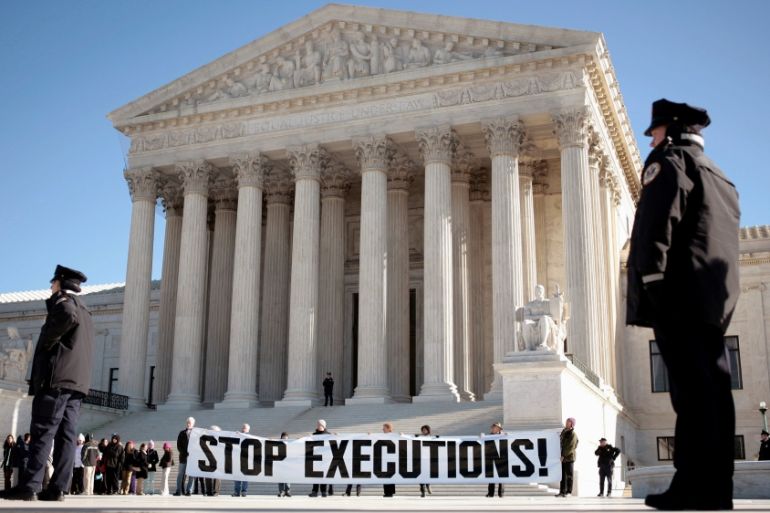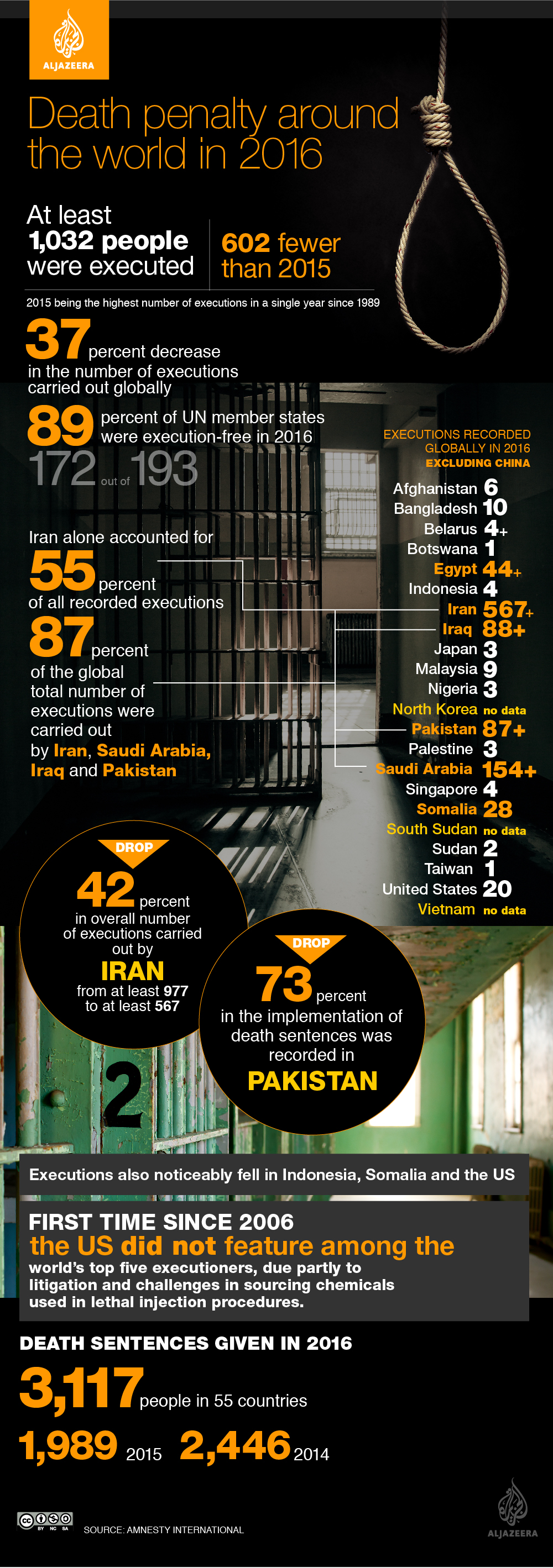Arkansas carries out first execution in 12 years
Ledell Lee, 51, executed after US Supreme Court denies petitions to halt a series of death sentences in Arkansas.

Arkansas has carried out its first execution in 12 years, according to local news media reports.
The southeastern US state executed Ledell Lee on Thursday at its Cummins Unit in Grady, which houses the state’s death chamber.
Keep reading
list of 4 itemsRecord number of people executed for drug offences in 2023
Executions in Iran hit 8-year high in 2023
Australian writer Yang Hengjun sentenced to death on China spy charges
Lee was pronounced dead four minutes before his death warrant was due to expire at midnight.
The US Supreme Court had cleared the way earlier in the day for Arkansas to conduct the execution by removing holds on the lethal injection, just 30 minutes before the state’s death warrant expired.
Lawyers for Lee, 51, who had maintained his innocence for years, had launched last-minute appeals to halt the execution with federal courts and the Supreme Court.
The US Court of Appeals for the 8th Circuit in St Louis considered a last-minute request from Lee for DNA testing, and had issued a stay until 9:15pm on Thursday (01:15 GMT Friday).
READ MORE: After death row – An unlikely love story
Lee was convicted and sentenced to death for beating Debra Reese to death with a tyre iron in 1993.
Reese’s relatives were at the Cummins Unit prison and told local news media Lee deserves to die for a crime that upended their lives.
“I pray this lawful execution helps bring closure for the Reese family,” Leslie Rutledge, the Arkansas attorney general, said just minutes after Lee’s execution.
But advocates for Lee condemned the execution.
“Arkansas’ decision to rush through the execution of Mr Lee just because its supply of lethal drugs are expiring at the end of the month denied him the opportunity to conduct DNA testing that could have proven his innocence,” said Nina Morrison, senior staff attorney with the Innocence Project, a non-profit legal organisation that helped represent Lee in his last appeals.
Two more Arkansas inmates are set to die on Monday, and one on April 27. Another inmate scheduled for execution next week has received a stay.
Legal wrangling
The Supreme Court ruling was the latest legal twist as Arkansas seeks to carry out a series of executions before one of the drugs used in its lethal injection mix, the sedative midazolam, expires by the end of the month.
Lawyers for the inmates argued that the state’s rush to the death chamber amounted to cruel and unusual punishment, violated the inmates’ right to counsel and their right to access the courts and counsel during the execution process.
The Supreme Court denied the petitions. One of them was a 5-4 decision in which new Justice Neil Gorsuch sided with the four other conservative justices in denying the motion while the court’s liberals dissented.
![Lee, 51, had maintained his innocence for years [Arkansas Department of Corrections]](/wp-content/uploads/2017/04/c51d0f28f7cd4dce8261fe17d4dc9c89_18.jpeg)
Earlier on Thursday, the top Arkansas court overturned a previous ruling that had blocked the use of one of the other three drugs that the state planned to use.
Arkansas had planned to execute eight inmates in 11 days, the most of any state in as short a period since the US Supreme Court reinstated the death penalty in 1976.
Courts have halted four of those executions. The state’s plan and the legal battles have raised questions about US death chamber protocols and lethal injection drug mixes
Back-to-back executions set for Monday were indefinitely halted.
Previous legal challenges prevented the state from executing any prisoner since 2005.
In the ruling on the state’s lethal injection drug, the Arkansas Supreme Court agreed with the state that it did nothing illegal in acquiring the muscle relaxant vecuronium bromide and lifted an order by a state circuit judge on Wednesday that blocked its use.
‘Assembly line of killings’
McKesson Medical-Surgical Inc, a pharmaceutical wholesaler, had argued that it sold Arkansas the drug for medical use, not executions, and that it would suffer harm financially and to its reputation if the executions were carried out.
Arkansas’ protocol calls for use of midazolam to render the inmate unconscious, vecuronium bromide to stop breathing and potassium chloride to stop the heart.
Anti-death penalty activists have protested in Arkansas against what has been labelled “assembly line killings”.
Midazolam has been linked to botched executions, and critics say it has proved ineffective in rendering unconsciousness prior to administration of the two lethal agents.
The American Civil Liberties Union (ACLU) said in a petition that “Arkansas wants to use an execution drug combination – with midazolam – that’s never been used before in the state and that risks making prisoners feel as if they are burning alive from the inside while paralysed”.
